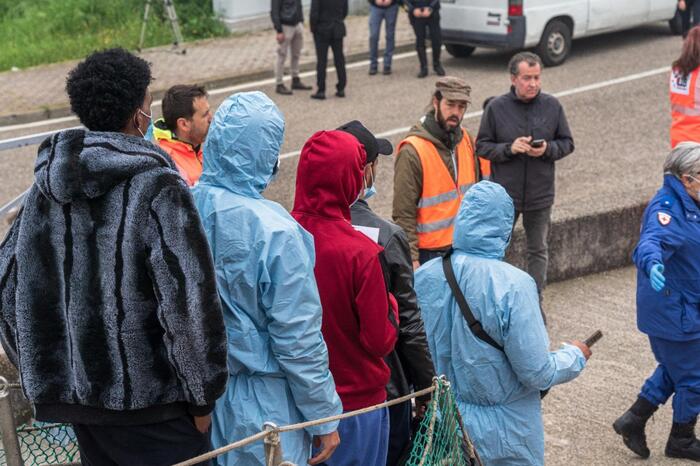Five years after experiencing the biggest migration crisis in its history as a club, the European Union is preparing to negotiate a new plan that will take it out of improvisation.
The present moment was ripe for a calm discussion.
Irregular migrant arrivals to Europe have been plummeting for years.
There are no elections in sight that can be capitalized on by the far right to scratch votes by stirring up the specter of invasion.
And the triumphant atmosphere for having been able to iron out the differences and seal a historic recovery plan in record time has left a certain positive inertia in the environment.
Then Moria caught fire.
The flames in the Greek camp have illuminated years of failure to manage arrivals.
And aware that the talks are going for a long time, Brussels wants to start the tug of war with the Twenty-seven as soon as possible, and has brought forward the presentation of its plan a week, from the 30th to the 23rd of this month.
In the absence of knowing the details, the European Commission will try to balance a carrot and stick policy as well as possible.
On the one hand, the proposed pact will include a firm commitment against human trafficking mafias, the shielding of external borders and the rapid expulsion of those migrants who do not have the right to asylum and have moved irregularly for economic reasons, narrowing collaboration with their countries of origin.
Brussels thus seeks to avoid the veto of the Hungarian Prime Minister, Viktor Orbán, and the Visegrad group - of which Poland, the Czech Republic and Slovakia are also part.
To balance the balance, the initiative will promote legal immigration, necessary to offset the aging of the European population, promote the development of sending countries to attack the root causes of migration, and defend the right of refugees to claim asylum in the face of hot expulsions at the border by the police, which sometimes unfairly deprive them of a process with guarantees.
A gesture towards the NGOs, very critical of the way the EU deals with the matter, and protagonists of the controversial bailouts in the Mediterranean that every summer bring the Commission upside down due to the difficulty in finding countries that open their ports to them.
The impression of the Community Executive is that at first the proposal will not satisfy anyone at all.
The arduous work of polishing it will then begin to find a common ground between the obligatory solidarity demanded by the front-line countries (Spain, Italy, Greece, Malta and Bulgaria), and the right to close their borders to the bone and reject the sadly famous cast quotas, the music that Budapest and its allies like.
The shock will take place in an environment of relative calm: migrant inflows reached a record 1.8 million in 2015, but plunged 92% last year to 139,000, according to Frontex figures.
In the first eight months of this year, the downward trend continues: 60,800 people have crossed borders irregularly, 14% less than the previous one.
“The pressure of the crisis did not allow fundamental structural decisions to be taken.
Now that the pressure is less strong, it is necessary to take advantage of it to move calmly towards durable solutions ”, says Jérôme Vignon, an expert at the Delors Institute in Paris.
Greek Deputy Minister of Migration, Giorgos Koumoutsakos, visiting Brussels to negotiate the new pact, has been among those who have tried to exert pressure until the last minute.
“Until September 23 there may be changes.
The Commission walks a fine line trying to accommodate the positions of the Member States, ”he explains.
In a meeting with journalists, he divided positions sharply: on the one hand, there are front-line countries, such as Greece or Spain, interested in a system that allows asylum seekers to be relocated from one country to another;
in front, the “noisy” countries of Visegrad, with the ultranationalists of Poland and Hungary at the forefront, who are flagging the frontal rejection of the quota mechanism;
and then, the third group, would be “all the others”, although Austria and Denmark move in intermediate waters.
It remains to be seen whether the recent tragedy on Lesbos softens spirits.
Koumoutsakos proclaims that the fire that devoured the camp should mark “the end of an era”, and believes that it has given the European debate a “
momentum
of solidarity”.
In his words: "Moria has had a catalytic effect."
In the EU, however, good intentions born the day after disasters are often not enough.
Given the outright rejection of the distribution of refugee quotas after the 2015 crisis, generosity cannot be taken for granted.
The mechanism of the vice minister's dreams has a name: "Mandatory solidarity."
Trust it to succeed, not like in the past.
Brussels has already shown that it is unwilling to trust its plan to goodwill.
“Today we have a better chance than in 2015. So we are working under the extreme pressure of an unprecedented crisis,” says Koumoutsakos.
Frontline countries, tired of dealing alone with asylum seekers arriving on their territory, do not want to wait any longer.
The reform of the failed Dublin system is the "Gordian knot of the negotiations," says Socialist MEP Juan Fernando López Aguilar, a member of the Home Affairs committee, which deals with migration policy.
The president of the Community Executive, Ursula von der Leyen, spoke during the debate on the state of the Union to restore "confidence" after years of mutual recriminations.
It remains to be seen what exactly will come next.
López Aguilar, who will have to vote for these measures in the future, when they reach Parliament, is clear: "We will not accept anything other than solidarity between countries."

/cloudfront-eu-central-1.images.arcpublishing.com/prisa/KLOGPM4SENAIHBYHRCFTQQOUAE.aspx)
/cloudfront-eu-central-1.images.arcpublishing.com/prisa/RYPA5FRAZ3W4EBDJLA3A5T2ZBI.jpg)




